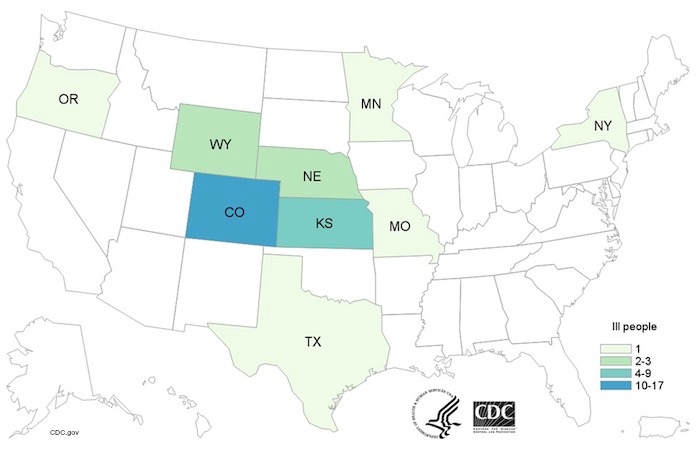The Salmonella Reading and Salmonella Albony outbreak linked to alfalfa sprouts produced and sold by Sprouts Extraordinare of Denver, Colorado is over, according to the CDC. Thirty-six people sickened with the outbreak strains of Salmonella were reported from nine states. Seven people were hospitalized; no deaths were reported.
 Epidemiologic and traceback evidence indicated that alfalfa sprouts that were supplied by Sprouts Extraordinare were the likely source of this outbreak. That company recalled alfalfa sprouts from the market place on August 5, 2016.
Epidemiologic and traceback evidence indicated that alfalfa sprouts that were supplied by Sprouts Extraordinare were the likely source of this outbreak. That company recalled alfalfa sprouts from the market place on August 5, 2016.
The CDC says that this outbreak appears to be over, but warns the public that “sprouts are known to cause foodborne illness and outbreaks.” In fact, since 1996 there have been at least 30 food poisoning outbreaks linked to the consumption of raw sprouts.
The case count for this outbreak by state is: Colorado (17), Kansas (9), Minnesota (1), Missouri (1), Nebraska (3), New York (1), Oregon (1), Texas (1), Wyoming (2). Of those ill persons, 30 were infected with Salmonella Reading, 1 was infected with Salmonella Albony, and 5 people were infected with both serotypes.
The illness onset date for this outbreak was from May 21, 2016 to September 10, 2016. The patient age range was from less than 1 year to 72, with a median age of 30. Fifty-six percent of ill persons were female.
In interviews, ill persons answered questions about the foods they ate before they got sick. Of the 31 patients interviewed, 18, or 58%, reported eating or possibly eating alfalfa sprouts the week before they got sick. This proportion is significantly higher than a typical response from health people, where only 3% reported eating alfalfa sprouts on a sandwich the week before they were interviewed.
A traceback investigation from five restaurants where patients reported eating raw alfalfa sprouts indicated that Sprouts Extraordinaire supplied that product to all five of those facilities.
To reduce your risk of getting food poisoning, always cook sprouts thoroughly to kill harmful bacteria. Children, older adults, pregnant women, people with chronic illnesses and those with weakened immune systems should avoid eating all raw sprouts of all kinds, including alfalfa, clover, radish, and mung bean. When buying a salad or sandwich at a restaurant or deli, check to make sure that raw sprouts have not been added.
If you do choose to eat sprouts, ask your retailer if they buy sprouts from companies that follow the FDA Guidance for Reducing Microbial Food Safety Hazards for Sprouted Seeds. Growing your own sprouts is no protection against possible food poisoning. The bacteria can be inside the seeds. And the growing environment for sprouts is perfect for bacterial growth: warm and moist.
The symptoms of a Salmonella infection include diarrhea, fever, abdominal cramps, nausea, and vomiting. The diarrhea may be watery and/or bloody. Symptoms usually appear six to seventy-two hours after exposure to the bacteria.
While most people recover on their own without medical attention after a Salmonella infection, some become so ill, from dehydration or sepsis (a blood infection) that they must be hospitalized. Even after someone recovers from Salmonella food poisoning, they can suffer long term complications, include Reiter’s Syndrome, which can cause reactive arthritis, high blood pressure, and irritable bowel syndrome.




